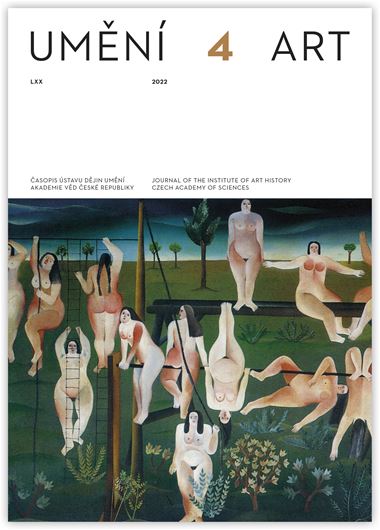Milena Bartlová – Jitka Šosová
Authenticity: a Critical Concept of the Construction of the New Canon of the Czech History of Modern Art
The study is an analysis of a Czech discourse of the 1980s–1990s focused on the concept of authenticity. It is based on the question of what instruments functioned after the change of political regime and while creating a new canon of Czech post-war modern art. In this context, the term authenticity proved to be a key concept. After 1990 it was not only used in professional discourse but also in public debate and in the media. It became paradigmatic, so there was no need to define it; its breadth made possible the processes of the discursive merging of what was formerly known as the grey zone with the intellectual environment of dissent. The text reaches these findings after research into the meaning of the term and its antithetical meanings, on the one hand in Martin Heidegger and on the other, in Theodor W. Adorno. It describes the different functions of the two trends in the Czech intellectual environment of the cultural opposition in the 1970s–1980s. The distinction between the meaning of concept Eigentlichkeit as the uniqueness of an individual linked to a society and the term authenticity understood as a characteristic of an exclusive individuality is an important moment. The long-standing discussion about the thinking of the critic Jan Lopatka in Czech literary scholarship is used for comparison with the discourse in art theory and history. It shows that despite their differences, the key theoretical problem was the question of how to understand the relationship between an artistic work on the one hand as a formalistically conceived centre of interest of theory and history, and on the other the necessity of dealing with the political opinions and the attitudes of the artist. The final part is devoted to a clarification of the situation in the late 1980s, when a younger artistic generation emerged advocating postmodernism and opposing the morally connoted concept of authenticity In this context the authors try to initiate a discussion about the key process of the adaptation of thinking which before 1990 was forcibly marginalised, and after 1990 became, on the contrary, the foundation of the new norm.
Author's email:
milena.bartlova@umprum.cz / sosova.jitka@gmail.com
DOI: HTTPS://DOI.ORG/10.54759/ART-2022-0401
Full-text in the Digital Library of the Czech Academy of Sciences:
https://kramerius.lib.cas.cz/uuid/uuid:8352acde-5deb-48d4-a1d3-6c40ff1e649d
< back

